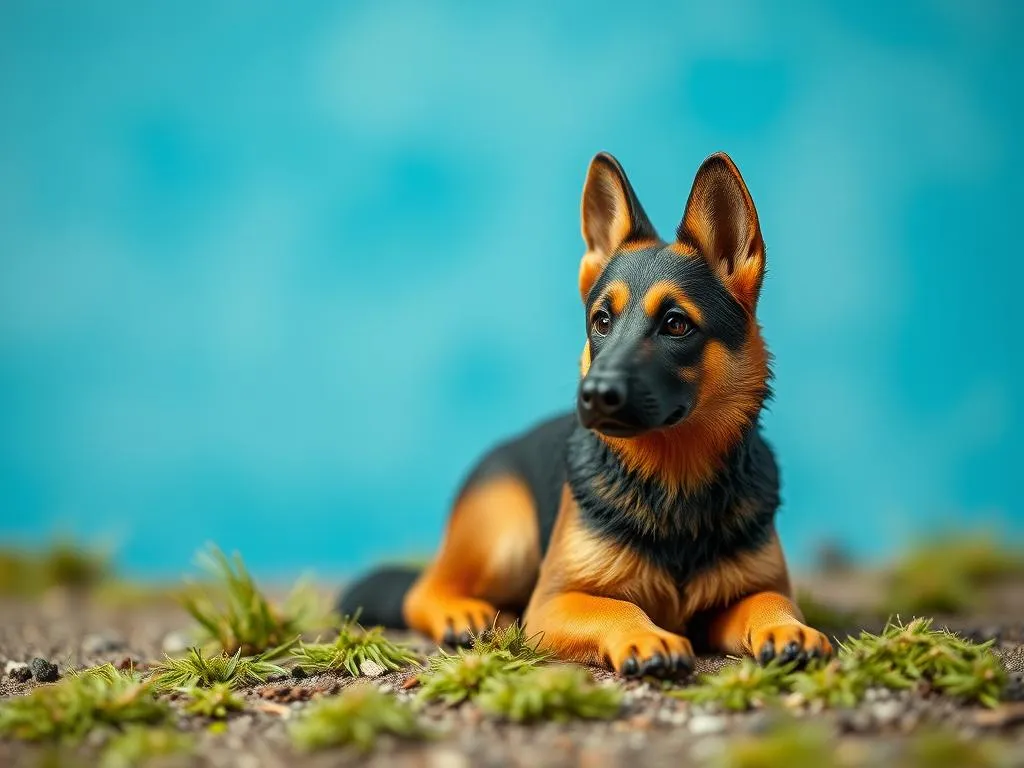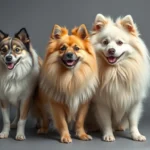
Introduction
Dog breeds come in a multitude of shapes, sizes, and temperaments, each offering unique traits that cater to different lifestyles. One breed that has gained popularity in recent years is the Miniature German Shepherd. This charming variant captures the essence of the traditional German Shepherd while providing a more compact size, making it an appealing choice for many potential dog owners. Understanding various dog breeds, including their characteristics and care needs, is essential for anyone considering bringing a canine companion into their home. In this article, we will delve into the fascinating world of the Miniature German Shepherd, exploring its origins, characteristics, health considerations, and much more.
The Miniature German Shepherd: An Overview
Origin of the Miniature German Shepherd
The Miniature German Shepherd is a relatively new breed that arose from the longstanding lineage of the standard German Shepherd, which was first developed in Germany in the late 19th century. Originally bred for herding and protection, the German Shepherd quickly gained a reputation for its intelligence, loyalty, and versatility. The desire for a smaller version of this remarkable breed led to the development of the Miniature German Shepherd.
While there is no official breed standard for the miniature variant, breeders select for smaller sizes, often using mixed breeding techniques that include crossing standard German Shepherds with other smaller breeds. This process has resulted in a dog that retains the essential characteristics of the German Shepherd while being more manageable for those with limited space.
Characteristics of the Miniature German Shepherd
The Miniature German Shepherd is characterized by its smaller stature compared to the standard breed. Typically, these dogs stand about 16 to 22 inches tall at the shoulder and weigh between 30 to 50 pounds. They have a well-proportioned body, with a strong, muscular build that mirrors the athleticism of their larger counterparts.
In terms of coat, the Miniature German Shepherd generally features a double coat, which can be straight or slightly wavy. Common colors include black and tan, sable, and solid black, although variations may occur depending on the specific lineage. Distinctive physical features often include erect ears, a bushy tail, and expressive eyes that radiate intelligence and alertness.
Temperament and Behavior
The temperament of the Miniature German Shepherd is one of its most appealing traits. These dogs are known for their high intelligence, loyalty, and eagerness to please their owners. They are highly trainable and thrive on mental stimulation, making them excellent candidates for obedience training and agility courses.
In general, Miniature German Shepherds exhibit a friendly and social nature, often bonding closely with their families. However, they can also be protective, inheriting the guarding instincts of their larger relatives. Proper socialization from an early age is crucial to ensure they develop into well-rounded adults.
Comparison with Standard German Shepherd
Size Difference
One of the most noticeable differences between the Miniature German Shepherd and the standard German Shepherd is size. Standard German Shepherds typically stand between 22 to 26 inches tall and weigh approximately 50 to 90 pounds. In contrast, the miniature variant is significantly smaller, making it more suitable for those living in apartments or smaller homes.
Temperament Variations
While both breeds share similar temperament traits, there can be variations in behavior and energy levels. Standard German Shepherds may exhibit a higher energy level due to their larger size and working dog background. In contrast, Miniature German Shepherds may have slightly less energy, although they still require regular exercise and mental stimulation.
Health Considerations
Health issues can vary between the two breeds. Standard German Shepherds are prone to certain genetic conditions, such as hip dysplasia and degenerative myelopathy. While Miniature German Shepherds may inherit some of these health concerns, they are often less susceptible due to their mixed breeding background. However, potential owners should always be aware of common health issues and seek regular veterinary care.
Benefits of Owning a Miniature German Shepherd
Ideal for Apartment Living
The Miniature German Shepherd is particularly well-suited for apartment living due to its compact size. Their moderate exercise needs can easily be met with daily walks and playtime, making them adaptable companions for those with limited space. Unlike larger breeds that require expansive yards, the miniature variant can thrive in smaller environments.
Family-Friendly Nature
These dogs are known for their friendly disposition and adaptability, making them great family pets. They tend to get along well with children and other pets, fostering a harmonious household. Their protective instincts also add a layer of security, as they are naturally alert and responsive to their surroundings.
Trainability and Intelligence
With their high intelligence and eagerness to learn, Miniature German Shepherds are exceptionally trainable. They excel in obedience training and can quickly pick up various commands and tricks. Their intelligence not only makes training enjoyable but also fosters a strong bond between the dog and its owner.
Care and Maintenance
Grooming Needs
Grooming the Miniature German Shepherd requires regular attention to keep their coat healthy and free of mats. Their double coat typically sheds moderately, so brushing them at least once a week is recommended, with more frequent grooming during shedding seasons. Regular brushing helps to reduce shedding and keeps their skin healthy.
Exercise Requirements
Despite their smaller size, Miniature German Shepherds need regular exercise to maintain their physical and mental health. Daily walks, play sessions, and interactive games are essential to keep them stimulated. Activities like fetch, agility training, and obedience exercises are excellent ways to engage their minds and bodies.
Dietary Needs
A well-balanced diet is crucial for the overall health of the Miniature German Shepherd. High-quality dog food that meets their nutritional needs should be prioritized. Owners should consult with a veterinarian to determine the best diet for their specific dog, taking into account age, activity level, and any health concerns.
Health Considerations
Common Health Issues
Like all breeds, Miniature German Shepherds can be predisposed to certain health issues. Common concerns include hip dysplasia, allergies, and obesity. Regular veterinary check-ups and screenings can help identify potential health issues early and ensure prompt treatment.
Regular Veterinary Care
Routine veterinary care is essential for maintaining the health of your Miniature German Shepherd. Regular vaccinations, dental care, and wellness check-ups are vital components of responsible pet ownership. Keeping an eye on their weight and dietary needs will also help prevent health-related issues.
Training and Socialization
Basic Training Techniques
Effective training techniques for Miniature German Shepherds often involve positive reinforcement methods. Reward-based training, where treats and praise are given for desired behaviors, works well with this intelligent breed. Consistency and patience are key components in training, especially in the early stages.
Importance of Socialization
Socialization is critical for Miniature German Shepherds to ensure they grow into well-adjusted adults. Early exposure to various people, environments, and other animals will help minimize fear or aggression. Puppy classes, playdates, and positive experiences with different situations can greatly enhance their social skills.
Behavioral Issues and Solutions
While Miniature German Shepherds are generally well-behaved, they can exhibit behavioral issues such as barking, chewing, or separation anxiety if not properly trained and socialized. Addressing these issues early through consistent training and providing ample mental and physical stimulation can prevent them from becoming problematic behaviors.
Finding a Miniature German Shepherd
Reputable Breeders vs. Adoption
When considering adding a Miniature German Shepherd to your family, the first step is deciding whether to purchase from a reputable breeder or adopt from a shelter. Responsible breeders focus on health and temperament, ensuring their puppies are well-socialized and genetically sound. Adoption offers the opportunity to provide a home to a dog in need, and many shelters may have mixed breeds that resemble the miniature variant.
Cost Considerations
The initial cost of acquiring a Miniature German Shepherd can vary significantly depending on the source. Prices from reputable breeders may range from $1,000 to $3,000, while adoption fees are typically lower, often between $100 to $300. In addition to the initial cost, ongoing expenses such as food, grooming, veterinary care, and training should also be factored into your budget.
Questions to Ask Before Bringing One Home
Before bringing a Miniature German Shepherd home, it’s essential to ask critical questions to ensure you are prepared. Inquire about the puppy’s health history, socialization experiences, and any specific care requirements. For those adopting, ask about the dog’s background, behavior history, and any known health issues.
Conclusion
The Miniature German Shepherd is an endearing and versatile breed that offers a wonderful blend of intelligence, loyalty, and adaptability. With their smaller size, they are an ideal choice for families, individuals living in apartments, or those seeking a devoted companion. Understanding their care needs, temperament, and health considerations is vital for potential owners.
Owning a dog is a rewarding experience filled with joy and companionship. However, it also comes with responsibilities that should not be taken lightly. Careful consideration of your lifestyle and the specific needs of the Miniature German Shepherd will ensure a fulfilling and harmonious relationship for both you and your furry friend.









